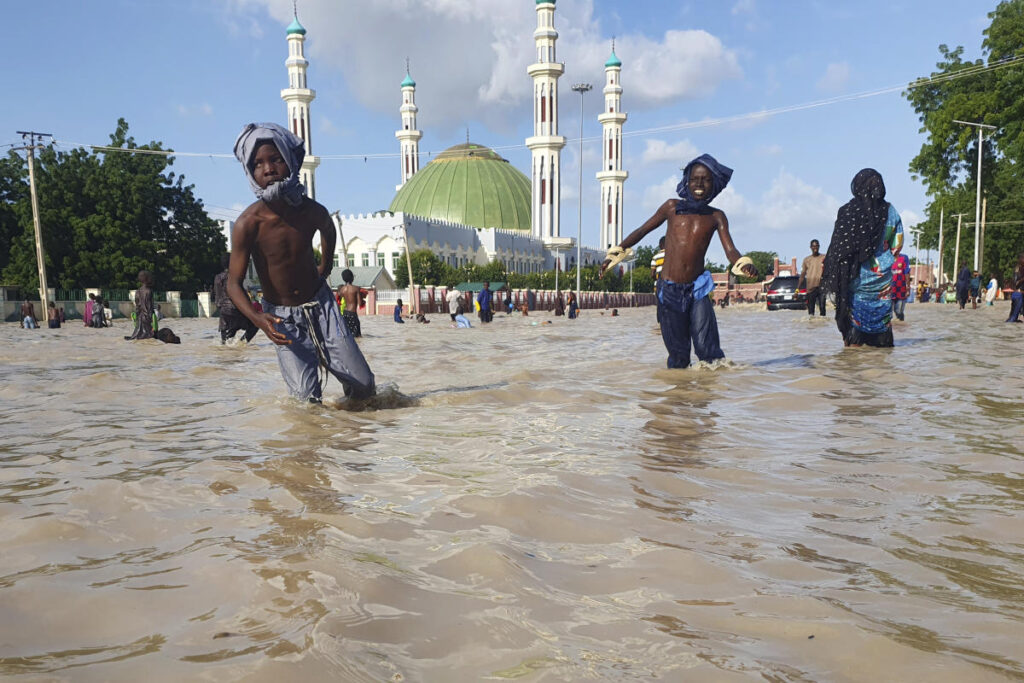ABUJA, Nigeria (AP) — Homes stripped to their last bricks. Prisoners flee in panic from the city’s main prison as waters rising from an overflowing dam wash away its walls. Corpses of crocodiles and snakes float among human bodies on what were once main streets.
While torrential rains in Central and West Africa are the most catastrophic flooding in decadesresidents of Maiduguri, the capital of Nigeria’s fragile Borno state, which has been at the centre of a Uprising of Islamic extremists —said they had seen it all.
The floods, which have killed more than 1,000 people and displaced hundreds of thousands across the region this year, have exacerbated existing humanitarian crises in the worst-affected countries: Chad, Nigeria, Mali and Niger. More than four million people have been affected by floods in West Africa so far this year, a threefold increase from last year, the UN said.
With rescue operations still ongoing, it is impossible to give an accurate number of lives lost in the water. So far, at least 230 deaths have been reported in Nigeria, 265 in Niger, 487 in Chad and 55 in Mali, which has suffered its most catastrophic flooding since the 1960s.
Although Africa accounts for a small share of global greenhouse gas emissions, it is among the countries most vulnerable to extreme weather conditionsthe World Meteorological Organization said earlier this month. In sub-Saharan Africa, the cost of adapting to extreme weather events is estimated at $30-50 billion a year over the next decade, the report said. It warned that up to 118 million Africans could be affected by extreme weather by 2030.
Maiduguri, the capital of Borno State, is under great pressure. In the past decade, Borno has been hit by a ongoing series of attacks by Boko Haram militantswho want to establish an Islamic state in Nigeria and have killed more than 35,000 people in the past ten years.
Saleh Bukar, a 28-year-old from Maiduguri, said he was woken up by his neighbors around midnight last week.
“Water is flowing everywhere!” he recalled their desperate cries in a telephone interview. “They were screaming, ‘Everybody come out, everybody come out!’” Elderly and disabled people didn’t know what was happening, he said, and some stayed behind. Those who didn’t wake up in time drowned immediately.
Local authorities are overwhelmed by the scale of the disaster: more than 400,000 people in Nigeria have been displaced and at least 240 people have died.
Last week, floods killed about 80% of the animals in the Borno State Museum Park and an unknown number of reptiles escaped. The city’s main prison was so damaged that hundreds of prisoners escaped. Waters toppled the walls of the local police station and several government offices.
The World Food Programme has set up kitchens that are providing food to displaced people in Maiduguri, as well as emergency food and cash aid to people in the hardest-hit areas. USAID said on Wednesday it has provided more than $3 million in humanitarian aid to West and Central Africa, including $1 million in the immediate aftermath of the floods.
But many say they were left to fend for themselves.
Floods in predominantly dry Niger have affected more than 841,000 people, killing hundreds and displacing more than 400,000.
Harira Adamou, a 50-year-old single mother of six, is one of them. She said the floods destroyed her mud hut in the northern city of Agadez.
“The rooms are destroyed; the walls have collapsed,” she said. “It’s a big risk to live in a mud hut, but we don’t have the resources to build one out of concrete.”
Adamou, who is unemployed and lost her husband four years ago, said she has received no support from the state and has not had the opportunity — or the means — to move. She and her children live in a temporary shelter next to their destroyed hut and worry that the torrential rains could return.
“I understood that there was a change in the weather,” she said. “I have never seen such heavy rainfall as this year here in Agadez.”
In Maiduguri, 15% of the city is still under water, according to local authorities. While forecasts predicted more rain in the region, Nigerian authorities warned earlier this week that more flooding was expected.
Bukar said he kept going back to see if the water that had swallowed his house had receded, but it hasn’t. He said he hasn’t received any help from authorities, other than some food distributed at the local school, where he and 5,000 others are staying.
He tries to stay healthy by helping others. Together with his friend, he helped recover 10 bodies and saved 25 people by rowing a canoe through the streets. He said he also helps cook meals for those sheltering with him.
“I volunteer to help, but I am also a victim,” he said. “Our people need us. They need help.”
___
Pronczuk reported from Dakar, Senegal.







